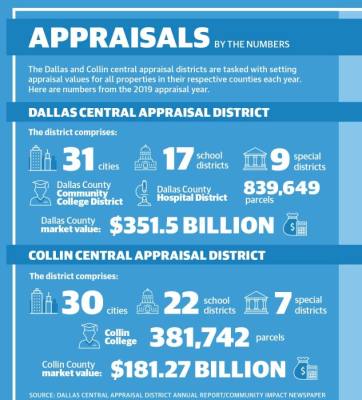Property owners typically begin receiving assessed value notices in the mail around this time each year. Already, chief appraisers from some of the region’s largest districts—Dallas, Collin, Tarrant and Denton—have announced the delay of those letters until the end of April or middle of May.
The lag in certified value mailouts will trigger a domino effect of calendar delays leading up to when taxing units have to adopt new tax rates in September, said Ken Nolan, chief appraiser at Dallas Central Appraisal District.
“Cities especially and possibly hospital districts are spending so much money. If they can’t get a tax rate and a budget set, they are going to run out of money,” Nolan said.
Once notices are delivered, appraisal districts are bracing for the likelihood of hundreds of people showing up to protest their property values in person, Nolan said.
“You’ve got 253 appraisal districts in the state of Texas that are about to put millions of notices out on the streets statewide, and you do not want people congregating in any one place when that happens,” Nolan said.
State law allows property owners 30 days to protest values once notices are received.
Chief Appraiser Bo Daffin with the Collin Central Appraisal District said he anticipates protest hearings to extend into September, when in the past, the bulk of hearings has concluded in July.
Given the uncertainty around what lies ahead, chief appraisers such as Nolan and Jeffery Law with the Tarrant Appraisal District said they hope the governor’s office will issue a statewide directive on how best to navigate the protest process.
“Guidance from the governor’s office was sought about the 2020 appeal process from several appraisal districts throughout the state,” Law said in an email. “But at this time the governor’s office has not waived or suspended any laws.”
In absence of direction from the state, appraisal districts are fortifying technologies to handle the inevitable increase of protests done via phone or online. Hope McClure, chief appraiser with the Denton Central Appraisal District, said that while the majority of protests are normally done in person, her office is prepared to conduct hearings virtually.
“We have one of the top IT teams in the state, and we are equipped to handle that. It will just definitely be a change,” she said.
The Denton office is still deciding whether members of the appraisal review board will be brought into the office for protest hearings, McClure said.
“Their health and well-being is our top priority, and we don’t want to endanger them in any way,” she said.
For Nolan, the prospect of gathering a three-member review panel for protest hearings seems unlikely given the average age of his board members is between 70 and 75 years old.
“That age group is not going to show up,” he said.
Nolan said he submitted a request with the state to hold single-member hearings but has yet to receive approval. Of the appraisal district’s 110 board members, Nolan expects about half would be willing to show up for protest hearings.
“I’m going to try and keep personal contact to a minimum in the summer, unless we get the all-clear,” he said. “But I don’t see us going back to business as usual until July.”
Appraisals in Texas are based on a property’s value as of Jan. 1. McClure and Nolan both said they expect financial hardship caused by COVID-19 to trigger a fair amount of pushback on value increases from property owners. But when it comes to lowering the dollar amount, they say their hands are tied.
“I know that chief appraisers are wanting to do something different for the taxpayers,” McClure said. “But what we are capable of doing and what we want to do are two different things.”
Appraisal districts must certify their tax rolls with area taxing entities by July 25, according to state law. If districts are unable to meet the deadline, the law allows them to send a certified estimate, which entities can use to set their tax rates, Nolan said.
However, the length of shelter-in-place orders will undoubtedly affect the accuracy of those estimates, he said. State law says taxing units must adopt a tax rate by Sept. 29.
“I can give the estimate under any circumstances. I just don’t know how good it is going to be,” Nolan said.
There have been several ideas floated within the appraisal district community on how to remedy issues caused by these delays. Some have even gone so far as to suggest suspension of appraisals for one year and instead roll values over from 2019.
But Nolan said that is unlikely, given the role property taxes play in the state’s school finance system.
“It hasn’t been getting any traction,” he said.






